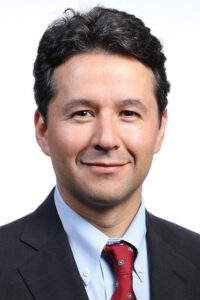Clinicians recognized that hyperglycemia could increase the morbidity and mortality of SARS-CoV-2 infection early in the COVID-19 pandemic. From early case reports to novel therapeutic approaches, the diabetes community moved quickly and decisively to better understand and counter the deadly interplay of COVID-19 and hyperglycemia.

“We saw very early that people admitted with hyperglycemia had worse health outcomes from COVID-19 than those with better glucose levels,” said Alberto Coppelli, MD, Section of Diabetes and Metabolic Diseases at the University of Pisa, Italy. “It was better if you knew you had diabetes and were taking insulin or metformin and your glycemia was even slightly controlled. People with uncontrolled hyperglycemia, whether they were diagnosed with diabetes or not, were much more likely to have more severe COVID and much more likely to die.”
Dr. Coppelli was lead author on one of the first studies to confirm a growing swell of anecdotal reports from hospitals around the world of worse outcomes for COVID-19 patients who also had hyperglycemia. He will open a special two-hour symposium on COVID-19 and Diabetes—An Update, which will begin at 2:00 p.m. ET on Friday, June 25.
The mechanisms that link hyperglycemia and COVID-19 outcomes are not entirely clear, Dr. Coppelli noted. It is not even clear if COVID-19 exacerbates an already robust inflammatory response, worsens insulin resistance, triggers beta-cell loss leading to de novo diabetes, or simply unmasks preexisting diabetes. Whatever the links, those early findings had important clinical implications for patients worldwide.
“When I was first on the COVID ward in 2019, we had no information on hyperglycemia—absolutely nothing,” he said. “I remember patients with high glucose levels not treated vigorously enough because we were focused on the infection. Now we know that if you have higher glycemic levels with or without prior diagnosis of diabetes, you have to get hyperglycemia treatment immediately.”
Francesco Rubino, MD, Chair of Metabolic and Bariatric Surgery at King’s College London, United Kingdom, will discuss the latest findings related to COVID-19 and new onset diabetes. Bruce W. Bode, MD, Clinical Associate Professor of Medicine, Emory University and Atlanta Diabetes Associates, will outline the latest approaches to managing and preventing diabetic ketoacidosis in COVID-19.

The session’s final speaker, Francisco J. Pasquel, MD, MPH, Assistant Professor of Endocrinology at Emory University, will describe the successful use of continuous glucose monitoring (CGM) for remote monitoring in the intensive care unit (ICU) during the pandemic.
“The lack of personal protective equipment and the increased risk for nurses and other health care workers meant we had to change the way we care for patients in the hospital, especially in the ICU,” Dr. Pasquel said. “Bringing CGM into the ICU let us keep using the standard of care, continuous insulin infusion, while reducing touch points and potentially the risk for infection. CGM let us reduce point-of-care interactions by more than 60% while keeping patients in their target glucose range most of the time.”
But the changes to diabetes care triggered by COVID-19 don’t end here, Dr. Pasquel added.
“COVID-19 has accelerated the use of new technology and new approaches using available technology,” he said. “Remote monitoring and other technologies are transforming care in both the inpatient and the outpatient settings.”
More sessions on COVID-19 and diabetes
Friday, June 25
- The Impact of COVID-19 on Foot Care in Diabetes, 11:30 a.m. – 12:30 p.m. ET
- COVID-19, Diabetes, and Pregnancy—The Perfect Storm?, 11:30 a.m. – 12:30 p.m. ET
- COVID-19 and Lipids—What’s the Connection?, 12:45 p.m. – 1:45 p.m. ET
- COVID-19 and Beyond—Viruses in Pediatric Diabetes, 12:45 p.m. – 1:45 p.m. ET
- Debate—Should Immune Intervention Trials Occur during the COVID-19 Pandemic?, 12:45 p.m. – 1:45 p.m. ET
- COVID-19 and Diabetes—An Update, 2:00 p.m. – 4:00 p.m. ET
Saturday, June 26
- Professional Interest Group Discussion on Exercise Physiology—Exercise in Post-COVID Infection—Implications for Treatment, Research, and Public Health, 11:30 a.m. – 12:30 p.m. ET
- Women’s Interprofessional Network of the ADA (WIN ADA)—Long-Term Professional Impact of COVID-19, 11:30 a.m. – 12:30 p.m. ET
- Professional Interest Group Discussion on Clinical Centers and Programs—Here to Stay? Harnessing Telemedicine for Diabetes Care in the COVID-19 Era and Beyond, 11:30 a.m. – 12:30 p.m. ET
- ADA Diabetes Care Symposium—Learning to Minimize Risks for People with Diabetes in the COVID-19 Pandemic, 8:00 a.m. – 10:00 a.m. ET
Monday, June 27
- Preserving Mental Health across the Lifespan of Living with Diabetes (and during COVID-19), 8:00 a.m. – 10:00 a.m. ET
- Efficacy and Safety of Dapagliflozin in Patients with and without Type 2 Diabetes Hospitalized with COVID-19—Results from the DARE-19 Global Randomized Controlled Trial, 2:15 p.m. – 3:15 p.m.
- When COVID-19 Clashes with Diabetes—Data and Experiences Regarding the Impact on People with Diabetes, 4:30 p.m. – 6:30 p.m. ET
Tuesday, June 28
- Professional Interest Group Discussion on Public Health and Epidemiology—Is Diabetes a Risk Factor for Adverse Health Outcomes in Patients with COVID-19?, 12:00 p.m. – 1:00 p.m. ET
- Communication of Risk in the Era of COVID-19—Public Health and Public Trust, 2:15 p.m. – 4:15 p.m. ET
- COVID-19, Diabetes, and Obesity, 4:30 p.m. – 6:30 p.m. ET
VIEW THIS PRESENTATION
Already registered?
View this presentation at ADA2021.org
Not yet registered?
Register now to access all presentations from the Virtual 81st Scientific Sessions

